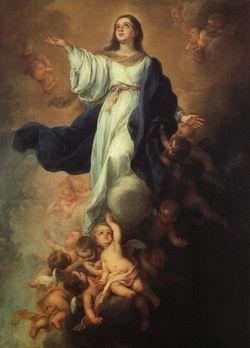Welcome to the third in a series of posts dealing with objections to the Catholic faith sent to me by an old friend who happens also to be Pastor of a Protestant church (we're calling him Pastor Pete for purposes of the series).
The two initial posts can be read here and here and I encourage you to read them both.
I've spent quite a bit of time researching how best to respond to the gist of Pastor Pete's initial objection (the first of 6 sent me) and had lined up numerous links and published pieces that I thought would best defend the dogma of Mary's Assumption but then came across a post put up just a few short months ago and thought, why re-invent the wheel.
It best responds, in a single piece, to Pastor Pete's problems with the assumption (see the second post in  the series to see exactly what he had to say about it) and it's written by none other than Elizabeth Scalia:
the series to see exactly what he had to say about it) and it's written by none other than Elizabeth Scalia:
While the dogma was only made definitive by Pope Pius XII in 1950 (Munificentissimus Deus), the tradition of Mary’s assumption after her death at Ephesus is an old, old one that, as demonstrated by early-fourth century Ethiopian apocrypha (Liber Requiei Mariae (The Book of Mary’s Repose), pre-dates the Bible.
But I’m not interested in apologetics or in re-arguing sola scriptura, an idea which, ironically enough, is also not found in scripture. I believe in the Assumption of the Blessed Virgin Mary not because my church tells me to, or because I am particularly pious. I believe it because of scripture and science, and frankly, for me science has the edge in the argument, because of microchimerism. I’ve written about this these past four years; learning that every child leaves within his mother a microscopic bit of himself — and that it remains within her forever — made the dogma of the Assumption a no-brainer for me.
In Psalm 16 we read a curious reference to body and soul:
And so my heart rejoices, my soul is glad;
even my body shall rest in safety.
For you will not leave my soul among the dead,
nor let your Holy One know decay.Christ’s divine body did not undergo corruption. It follows that his mother’s body, which forever contained a cellular component of the Divinity — and a particle of God is God, entire — would not be allowed to corrupt as well, but would be taken into heaven and reunited with Christ. Mary was a created creature and moral. But she was no mere mortal; she could not be, once the particles of God had entered her chemistry.
I hope you (and of course Pastor Pete) will read her entire piece as it also links to a post by Msgr. Charles Pope covering the biblical roots of the Assumption and, on a related aside, delves into why we as Catholics yearn for the Eucharist where we get to "share a small portion of Mary’s larger reality".
Please read the whole thing. Lots there that makes so much sense.
The next post in the series will address the perpetual virginity of Mary.
